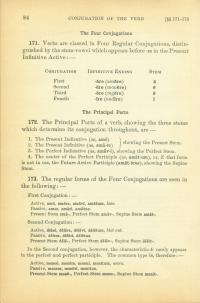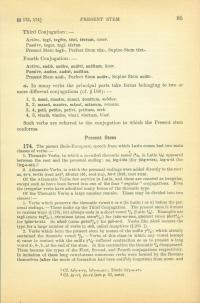171. Verbs are classed in Four Regular Conjugations, distinguished by the stem vowel which appears before -re in the Present Infinitive Active.
| CONJUGATION | INFINITIVE ENDING | STEM |
| 1st | -āre (am-āre) | -ā- |
| 2nd | -ēre (mon-ēre) | -ē- |
| 3rd | -ĕre (reg-ĕre) | -ĕ- |
| 4th | -īre (aud-īre) | -ī- |
172. The Principal Parts of a verb, showing the three stems which determine its conjugation throughout, are—
- The Present Indicative (amō), showing the Present Stem.
- The Present Infinitive (amā-re), showing the Present Stem.
- The Perfect Indicative (amāv-ī), showing the Perfect Stem.
- The neuter of the Perfect Participle (amāt-um), or, if that form is not in use, the Future Active Participle (amāt-ūrus), showing the Supine Stem.
173. The regular forms of the Four Conjugations are seen in the following.
1st Conjugation:
Active— amō, amāre, amāvī, amātum [love]
Passive— amor, amārī, amātu
Present Stem amā-
Perfect Stem amāv-
Supine Stem amāt-
2nd Conjugation:
Active— dēleō, dēlēre, dēlēvī, dēlētum [blot out]
Passive— dēleor, dēlērī, dēlētus
Present Stem dēlē-
Perfect Stem dēlēv-
Supine Stem dēlēt-
In the Second conjugation, however, the characteristic -ē- rarely appears in the Perfect and Perfect Participle. The common type is, therefore:
Active— moneō, monēre, monuī, monitum [warn]
Passive— moneor, monērī, monitus
Present Stem monē-
Perfect Stem monu-
Supine Stem monit-
3rd Conjugation:
Active— tegō, tegĕre, tēxī, tēctum [cover]
Passive— tegor, tegī, tēctus
Present Stem tegĕ-
Perfect Stem tēx-
Supine Stem tēct-
4th Conjugation:
Active— audiō, audīre, audīvī, audītum [hear]
Passive— audior, audīrī, audītus
Present Stem audī-
Perfect Stem audīv-
Supine Stem audīt-
a. In many verbs the principal parts take forms belonging to two or more different conjugations (cf. § 189).
1st and 2nd— domō, domāre, domuī, domitum [subdue]
2nd and 3rd— maneō, manēre, mānsī, mānsum [remain]
3rd and 4th— petō, petĕre, petīvī, petītum [seek]
4th and 3rd— vinciō, vincīre, vīnxī, vīnctum [bind]
Such verbs are classified according to which conjugation the Present stem belongs.


